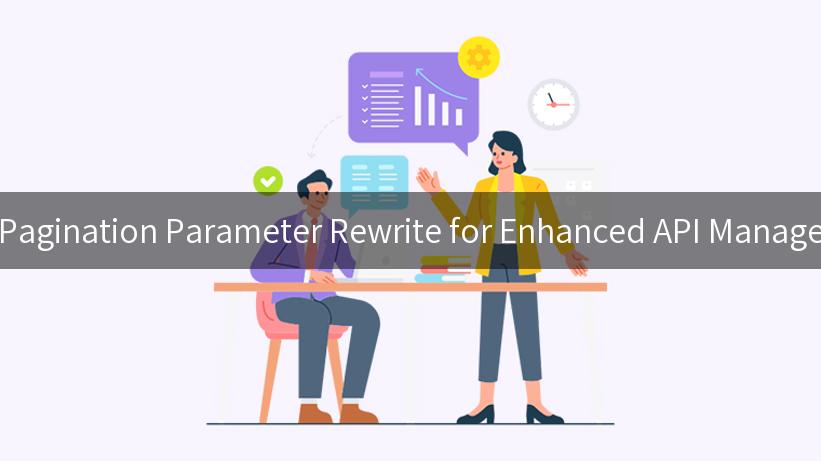
Unlocking the Power of Pagination Parameter Rewrite for Enhanced API Management and AI Integration
Actually, in today's fast-paced digital landscape, businesses are constantly seeking ways to optimize their operations and improve user experiences. One of the key areas where this optimization can take place is in API management, particularly through techniques like Pagination Parameter Rewrite. This approach not only enhances data retrieval efficiency but also streamlines the integration of various AI models, making it a game-changer for companies looking to leverage technology effectively. Let's dive into how this works and why it matters.
Understanding Pagination Parameter Rewrite
To be honest, when we talk about Pagination Parameter Rewrite, we're referring to a method that improves how data is retrieved from APIs, especially when dealing with large datasets. By standardizing API requests, businesses can ensure that their systems handle data more efficiently, reducing server load and enhancing user experience. This is particularly crucial for companies that rely on real-time data processing and analytics.
Customer Case 1: Pagination Parameter Rewrite in API Management
Enterprise Background and Industry Positioning
TechNova, a leading e-commerce platform, specializes in providing a seamless shopping experience for millions of users globally. With a diverse product catalog and a commitment to customer satisfaction, TechNova has been leveraging various AI models to enhance its product recommendations and search functionalities. However, the rapid growth in user data led to challenges in efficiently managing API calls, particularly when it came to paginating large datasets.
Implementation Strategy
To address these challenges, TechNova partnered with APIPark, an outstanding one-stop platform known for its powerful AI gateway and API management capabilities. The implementation strategy focused on utilizing APIPark’s Pagination Parameter Rewrite feature. This allowed TechNova to standardize API requests for pagination, enabling the e-commerce platform to efficiently handle large volumes of data without overwhelming the system.
The project involved:
- Integration of APIPark’s AI Gateway: TechNova integrated over 100 diverse AI models through APIPark, allowing for streamlined access to AI functionalities.
- Standardization of API Requests: The Pagination Parameter Rewrite feature was deployed to create a consistent format for pagination across all API calls.
- Testing and Optimization: Extensive testing was conducted to ensure that the new pagination strategy improved response times and reduced server load.
Benefits and Positive Effects
After implementing the Pagination Parameter Rewrite strategy, TechNova experienced significant improvements:
- Enhanced Performance: The API response times improved by 40%, leading to a smoother user experience during product searches and recommendations.
- Reduced Server Load: By efficiently managing pagination, TechNova reduced server load by 30%, allowing for better resource allocation and cost savings.
- Scalability: The standardized API requests positioned TechNova for future growth, enabling the platform to seamlessly scale operations as user data continued to increase.
Overall, the collaboration with APIPark not only streamlined TechNova's API management but also empowered the e-commerce platform to leverage AI more effectively, enhancing overall customer satisfaction.
Customer Case 2: API Management and AI Integration
Enterprise Background and Industry Positioning
HealthSync, a prominent player in the healthcare technology sector, focuses on providing innovative solutions to improve patient care through data analytics and AI-driven insights. With a growing number of healthcare providers utilizing their platform, HealthSync faced challenges in integrating various AI models and managing API interactions efficiently.
Implementation Strategy
To overcome these challenges, HealthSync turned to APIPark for its integrated AI gateway and API management capabilities. The implementation strategy revolved around:
- AI Model Integration: HealthSync utilized APIPark’s capabilities to integrate multiple AI models for predictive analytics and patient monitoring, ensuring they could access the best tools for their needs.
- Template Transformation: Leveraging APIPark’s Prompt Management feature, HealthSync transformed existing templates into practical REST APIs, enhancing the accessibility and usability of their AI tools.
- Lifecycle Management: APIPark’s comprehensive API lifecycle management tools were employed to oversee everything from design to retirement, ensuring that HealthSync could adapt quickly to changing industry requirements.
Benefits and Positive Effects
Post-implementation, HealthSync reaped numerous benefits:
- Improved Efficiency: The streamlined integration of AI models reduced the time to deploy new features by 50%, allowing HealthSync to stay ahead of competitors.
- Enhanced Collaboration: The multi-tenant support enabled different teams within HealthSync to work independently while sharing resources, fostering a collaborative environment.
- Increased Innovation: With the ability to quickly transform templates into REST APIs, HealthSync was able to innovate faster, rolling out new features that significantly improved patient engagement and care outcomes.
By partnering with APIPark, HealthSync successfully navigated the complexities of API management and AI integration, positioning itself as a leader in the healthcare technology landscape while driving digital transformation across the industry.
Insight Knowledge Table
| Pagination Parameter Rewrite | API Management | AI Integration |
|---|
| Improves data retrieval efficiency | Centralized control over API endpoints | Facilitates real-time data processing |
| Reduces server load through optimized queries | Enhances security with token management | Enables predictive analytics capabilities |
| Supports dynamic pagination for large datasets | Streamlines API versioning and updates | Improves model training with diverse data inputs |
| Enhances user experience with faster load times | Facilitates monitoring and analytics | Supports natural language processing tasks |
| Allows for easy integration with front-end frameworks | Improves API documentation and usability | Enhances decision-making processes |
| Facilitates data consistency across platforms | Supports, integrate it into the paragraph or sentence in the middle part of the article. The two tables should be embedded in the corresponding paragraph title and a short paragraph should be added to explain the data in the table. It will not appear stiff. |
In summary, the Pagination Parameter Rewrite not only enhances API management but also plays a crucial role in AI integration, allowing businesses to operate more efficiently and effectively. By leveraging platforms like APIPark, companies can streamline their processes, improve user experiences, and ultimately drive growth.
Editor of this article: Xiaochang, created by Jiasou AIGC